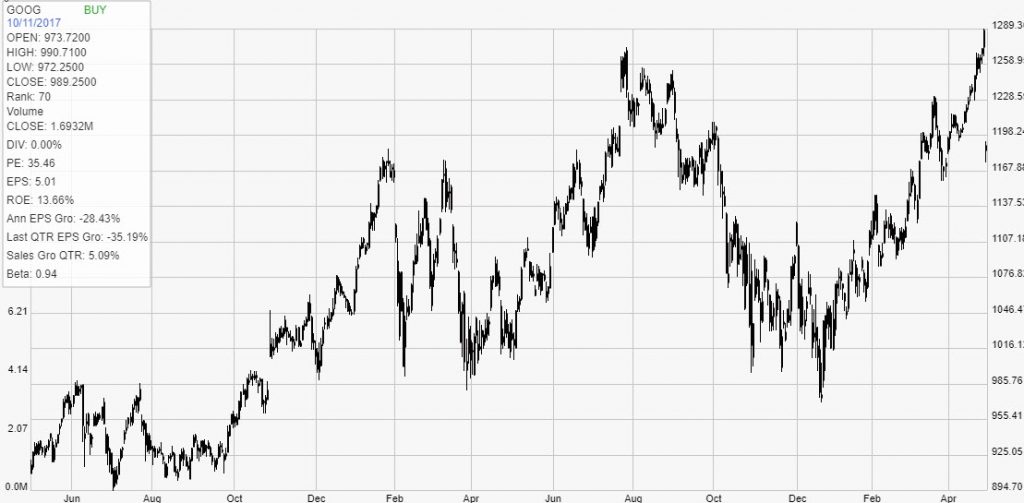Alphabet Inc. (GOOG) rocked the entire stock market on Tuesday after the parent company of Google released its Q1 earnings report late Monday afternoon. Despite beating bottom-line estimates, the company missed on the top line and reported sharply lower ad revenue growth from the year-ago quarter.
GOOG’s losses weighed down the tech-centric Nasdaq, as the index fell 0.7% following a euphoric all-time high near 8,162 on Monday. Investors are scared that the report marks a permanent turning point for the tech titan, stoking worries that ad revenue – the company’s long-time bread and butter – will continue to experience declining growth in the coming quarters.
Here’s just how bad Alphabet’s earnings report was on Monday – and what the firm’s outlook is shaping up to be…
The News
When observing the most common earnings metrics like earnings per share (EPS) and revenue, Alphabet’s earnings don’t seem too troubling. The firm earned $11.90 per share, smashing Wall Street’s estimate of $10.61 per share by nearly 11% and climbing 19.8% from the year-ago EPS of $9.93. The $36.34 billion in revenue earned in Q1 missed the $37.33 billion estimate by 2.7% but was still up 16.7% year-over-year from $31.15 billion.
It was the decelerating ad revenue that made tech investors run for the hills. Alphabet said ad revenue across all business grew only 15.3% in the January-March period, down from 24% a year ago and 19.9% in Q4 2018. Granted, the Q1 2018 rate was a record high, but the 15.3% reported on Monday was the lowest level in more than two fiscal years. Some of the slowdown was blamed on YouTube, which CFO Ruth Porat attributed to the company’s efforts early last year to curb harmful content on the site. Other metrics were similarly dour, including traffic acquisition costs (TAC) – the amount of money Google pays to vendors like Apple Inc. (AAPL) to be their products’ default search engine – coming in below expectations at $6.86 billion.
Bearish analysts came out in droves following the report, with JPMorgan Chase & Co. (JPM) forecasting the stock “to be under pressure in the near-term given sub-20% revenue growth and downward earnings revisions.” The JPMorgan analysts continued by saying that investors may remained frustrated as the firm’s “lack of transparency will only increase” and lead to further declines in stock price.
How Investors Reacted
Shares of GOOG plunged from $1,287.58 at Monday’s close to $1,188.48 on Tuesday, resulting in a one-day decline of 7.7%. Not only was that the stock’s largest drop since Oct. 18, 2012 when shares fell more than 8%, but the drop also wiped out $67 billion from Alphabet’s market cap, which currently sits at $827.7 billion. With Tuesday’s close, GOOG’s year-to-date gain is now only 14.8% from the Dec. 31 close of $1,035.61 per share.
Additionally, GOOG stock was the S&P 500’s biggest loser during Tuesday’s session. It was worse than oilfield services firm Baker Hughes (BHGE) and GOOGL – Alphabet’s slightly more expensive class of stock that ensures more voting rights than GOOG. Both stocks fell 7.51% and 7.5% on the day, respectively.
The Bigger Picture
Judging from the record selloff, Google’s declining ad growth was largely a surprise to investors on Tuesday. What’s far less surprising about the business is how it continues to find itself – along with other large Internet companies like Facebook Inc. (FB) – in hot water with government agencies.
That fact certainly affected the Q1 financials in the form of a $1.7 billion fine levied against the company by the European Commission last month. The massive penalty was a response to Google’s alleged abuse of “market dominance by imposing restrictive clauses in contracts with third-party websites,” according to the European Commissioner for Competition Margrethe Vestager. In other words, the company is being accused of preventing publishers from placing ads from competitors on Google’s page results. This was Europe’s third-largest fine against the company in less than two years, following a $2.72 billion fine in June 2017 and $4.87 billion penalty in July 2018.
It’s clear that the EU has it out for Google, signaling the bloc’s strong effort to separate itself from the United States’ more relaxed attitude toward tech titans. Vestager in particular is viewed as a crusader against the U.S. tech industry, having led investigations not just into Google but also into Apple, Facebook, and Qualcomm Inc. (QCOM) in recent years.
Other tech firms have voiced concerns over Europe’s more iron-fisted approach toward tech companies, indicating how it will likely continue. Jeremy Stoppelman, the chief executive of Yelp Inc. (YELP), told The New York Times that the EU “is acting to enforce antitrust laws where the U.S. is not” as a result of the U.S. Federal Trade Commission (FTC) deciding not to pursue a 2013 antitrust case against Google, which set a precedent that’s lasted ever since.
Looking Ahead
If Vestager’s zeal indicates anything, it’s that she’ll continue to keep Google and Big Tech under a microscope for the forseeable future. She’s clearly not afraid to slap fine after fine on Google, which forces the conclusion that the fines may grow in size just as Alphabet’s ad revenue starts experiencing decelerating growth. This could ultimately turn into a perfect storm of stock losses for the company, a scenario that should entice investors to hold off on entering GOOG or GOOGL at this juncture.
